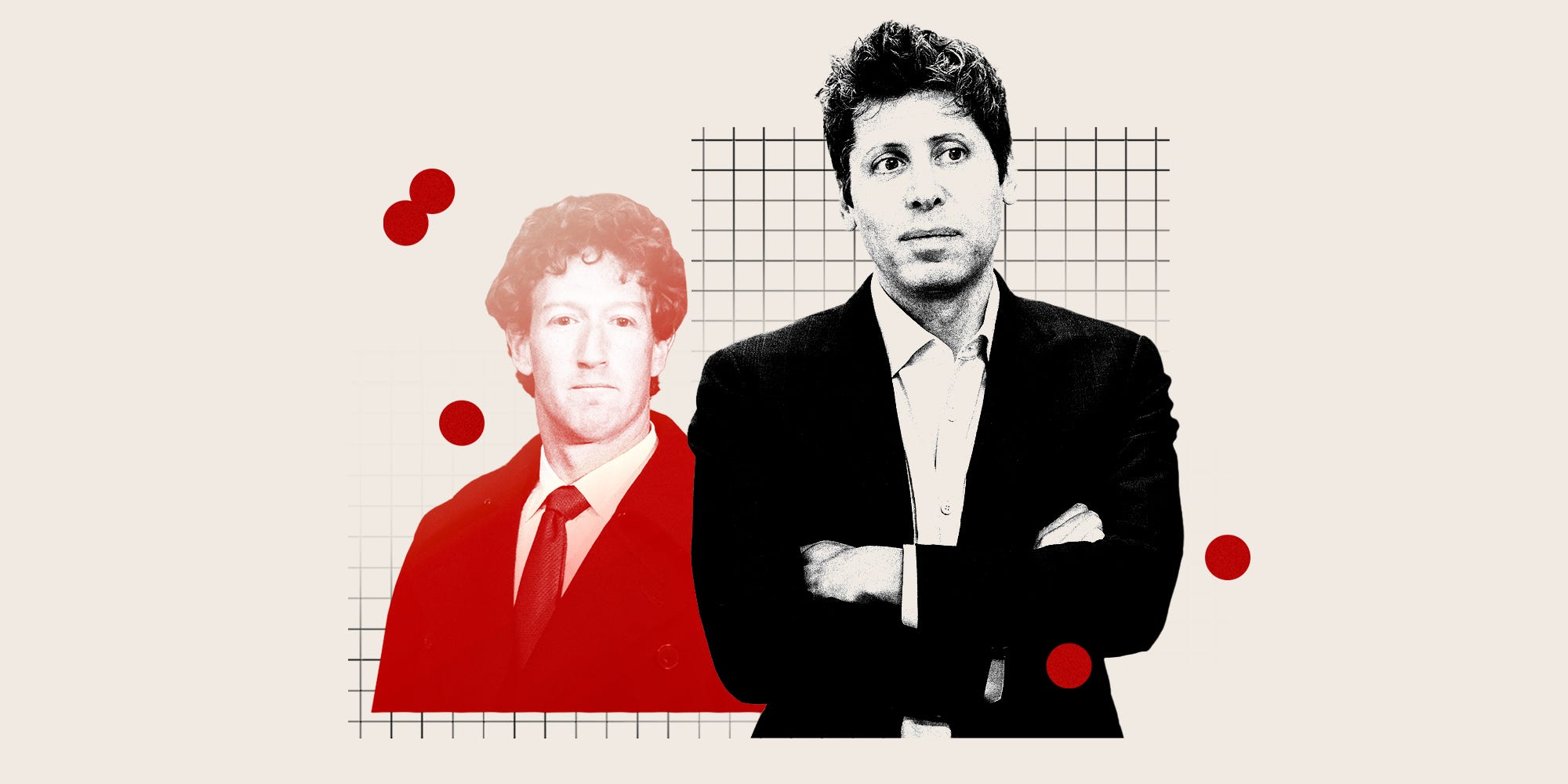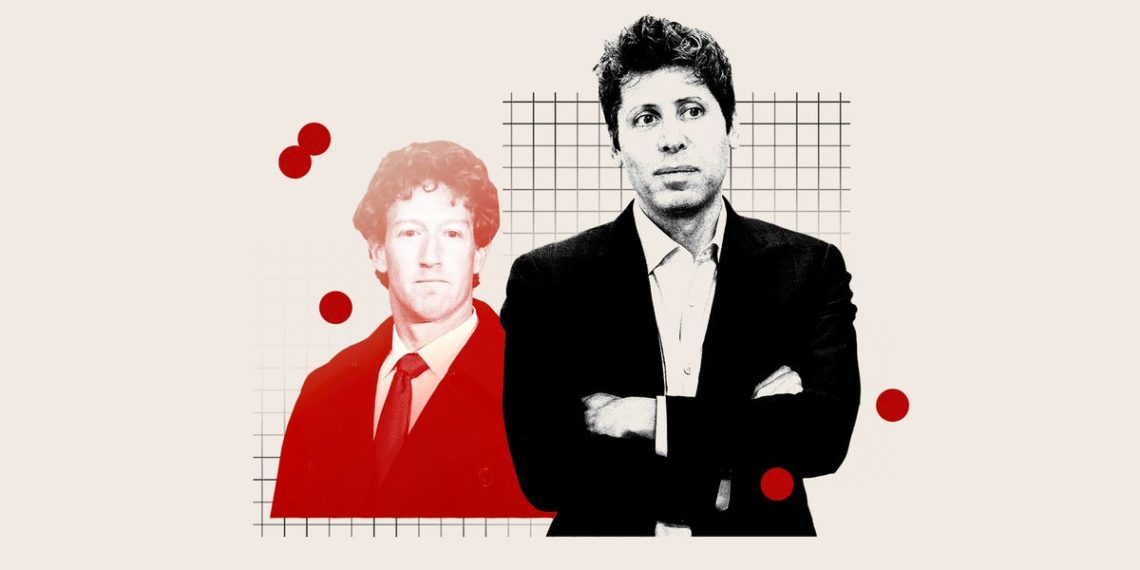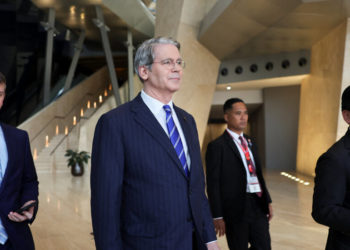
SHAWN THEW/Getty Images; Florian Gaertner/Getty Images; Tyler Le/BI
In a 2009 interview, a 25-year-old Mark Zuckerberg offered a grand prognosis on the human condition. “You have one identity,” the Facebook founder said. “The days of you having a different image for your work friends or coworkers and for the other people you know are probably coming to an end pretty quickly. Having two identities for yourself is an example of a lack of integrity.”
At the time, his five-year-old social network was shaping the identities of more than 350 million people. Like Sergey Brin and Larry Page with their mission to “organize the world’s information” with Google, like Steve Jobs when he put the internet in our pockets, Zuck was becoming something of the world’s new Minister of Thought — influencing how humans conceived of themselves and one another as they communicated at an unprecedented scale.
Today, 16 years and arguably several identities later (from the hoodie-wearing “I’m CEO, bitch” wunderkind to the suit-wearing presidential prospect to the shirtless jiu jitsu-fighting MAGA beefcake), Zuck is starting to cede that title to another tech leader who is shaping human cognition at perhaps an even grander scale, Sam Altman.
ChatGPT, just three years old, has more than 800 million weekly users, at least 40 times Facebook’s audience three years in. OpenAI is now the most valuable private company worldwide. Ten percent of the world’s adults use its flagship chatbot on a monthly basis — for writing emails and scouring the web, planning trips, decoding medical mysteries, or finding love.
Where Zuck taught us to post, Altman teaches us to prompt. If the past twenty years were about curating who we are, the next may be about creating who we want to be.
Facebook rewired how we see ourselves and each other. Posts, pokes, photos, and likes stitched together a specific digital avatar. Instagram gave us filters. The feed’s ranking systems rewarded the glossiest slice of life — the latté foam art and dopamine décor. Zuckerberg promised to “bring the world closer together.” He didn’t say we’d show up unvarnished.
Altman’s world is generation, not just presentation. Filters that boost saturation and darken edges have been supplanted by “Ghiblified” photo edits. Sora lets users turn rough ideas into hyperreal videos. I cast myself in a fake space opera; Mark Cuban tap danced with the late Ginger Rogers. These tools don’t polish reality so much as draft new versions of it.
I’ve seen the appeal up close. My husband, historically terrible at gifts, recently nailed it on my birthday: gold hoops and a Catbird necklace with our daughter’s initial. His confession — “I used ChatGPT” — felt both cute and slightly disorienting. If a bot is co-authoring intimacy, what else are we outsourcing? Holiday cards, wedding toasts, and homework may be just the start.
The office is already there. Studies suggest generative tools can speed up knowledge work and lift quality, especially for low performers. Emails became more polished, decks more dazzling. That power also comes with a catch: more “workslop” to sift and lower productivity if misused.
In the age of social media, we curated our identity for the computer. In the age of AI, the computer is starting to curate our identity for us.
There’s a bigger platform shift underneath all of this. Facebook’s feed once redistributed attention outward. Publishers lived and died by referral traffic. AI flips the model. Large language models ingest the open web and answer queries in its place. Where Zuckerberg built a web of people and links, Altman built a funnel. The user asks, it synthesizes. That convenience is already hitting publishers.
Zuckerberg started Facebook to connect his Harvard class. His ambitions went global. Facebook groups knit together new parents, bird watchers, English learners, and Bronies. The company has expanded internet access in developing countries.
The same algorithms that brought us closer also sorted us apart. Ranking systems fed people more of what they already agreed with, hardening echo chambers. Critics accused Facebook of supercharging conspiracies and “fake news” — around elections, the environment, and health.
Altman isn’t auditioning as a great communitarian. His concerns lie with the human-to-machine connection.
People are consulting ChatGPT as “a sort of therapist or life coach,” Altman said, a trend he admitted made him feel “uneasy.” Others are falling in love with the chatbot. Soon, a gated adult mode will offer erotica for personalized fantasy on demand. That’s the shift from the public square to private rooms.
Early evidence points to extreme tradeoffs. In March, a study from OpenAI and the MIT Media Lab found that ChatGPT heightened feelings of loneliness in a group of power users. Last month, parents of two teens who died by suicide after talking to chatbots testified to Congress about the technology’s harms.
Zuckerberg still regulates humanity’s attention; Meta has some 3.5 billion daily active users across its products. He has credited fast-improving algorithms with putting content people actually want in front of them, increasing time spent on the company’s apps in the second quarter. Altman is moving into intention, the first — and in some cases final — draft of what we say and do.
Zuckerberg isn’t ceding the future to Altman. He’s desperately trying to catch up: billions in capex for data centers and chips, Meta Superintelligence Labs, and aggressive, NBA superstar-level offers to poach researchers. In July, Facebook published a new manifesto: “personal superintelligence for everyone,” essentially echoing the frontier Altman staked out.
There’s upside. Coauthoring with machines can widen who gets to sound sharp, ship better work, or just be kinder in the group chat. There’s also creep. The more we rely on a model as our first reader and first responder, the easier it is to mistake its output for our own thinking.
In the age of social media, we shaped and curated our identity — or identities — for the computer. In the age of AI, the computer is starting to shape and curate our identities for us.
Melia Russell is a reporter with Business Insider, covering the intersection of law and technology.
Read the original article on Business Insider
The post Move over, Zuck. Sam Altman is the world’s new minister of thought. appeared first on Business Insider.




